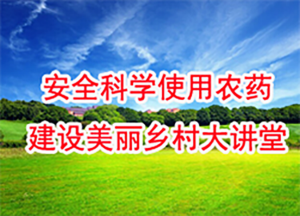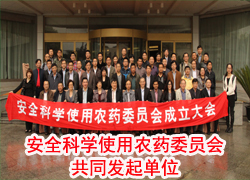
Chinese Government Promotes Recycling of Pesticide Package Wastes
責任編輯:Cong Lv 來源:China Crop Protection Industry Association 日期:2015-01-09
ACCORDING TO STATISTICS:
Ø There are 5~10 pesticide packages left on every mu of farmlands in average.
Ø There are 3.2 billion waste pesticide packages in China every year, weighing about 100,000 to 150,000 tonnes.
Ø After using the pesticides, the users throw the pesticide bottles or bags on fields or in rivers, and only about 2~3% of the users consider handling the bottles or packages by burning (non-professionally) or burying them.
Above is the current situation of pesticide package pollution in China. It’s undeniable that pesticides have played an irreplaceable role in guaranteeing national agricultural production. However, the impact of pesticide package wastes on the environment has become an agricultural environmental issue that cannot be ignored.
Recently, the annual meeting of China Crop Protection Industry Association (CCPIA) Professional Committee for Pesticide Packaging was held in Nanjing. Shan Zhengjun, an official of MEP, introduced the work on pesticide package waste pollution control and environmental management. He pointed out that pesticide package waste pollution has raised concerns among government departments like the Ministry of Environmental Protection, the Ministry of Agriculture, the Ministry of Industry and Information Technology and Ministry of State Security, and state leaders such as Zhang Gaoli has instructed on pesticide package waste pollution control and environmental management. The Measures for Environmental Management of Pesticide Package Wastes is currently being formulated.
Actually, there are many international experiences on the treatment of pesticide package wastes. The EU, United States and Brazil have formed mature treatment mechanisms. However, the formulation of policies should be based on national conditions. China has a large farmer population, and most of them have low level of awareness on environmental protection and farmers in China are still vulnerable groups. It is unrealistic to assign farmers as the main forces for recycling pesticide package wastes. Based on the national conditions and the exploration of management modes, Shan Zhengjun pointed out that the “Measures” will include requirements on aspects of packaging, recycling and treatment; requirements on the materials and specifications of pesticide packages will be strictly set to make it easy for recycling and treatment; manufacturers will be assigned as the responsible entities for recycling of pesticide package wastes; and the treatment aspect will follow the principles of “reducing quantity, harmless and recycling” so as to treat the wastes in a scientific way.
At the meeting, representatives from packaging enterprises and Shan Zhengjun had in-depth discussions and communication on policy making. Shan Zhengjun said that the policy is currently in the process of development, and to ensure the implementation of the policy, the government will respect the advice of the enterprises and make reasonable adjustments.
中國農(nóng)藥工業(yè)網(wǎng) 版權所有
地址:北京市朝陽區(qū)農(nóng)展館南里通廣大廈7層
電話:010-84885233 京公網(wǎng)安備11010502025163










